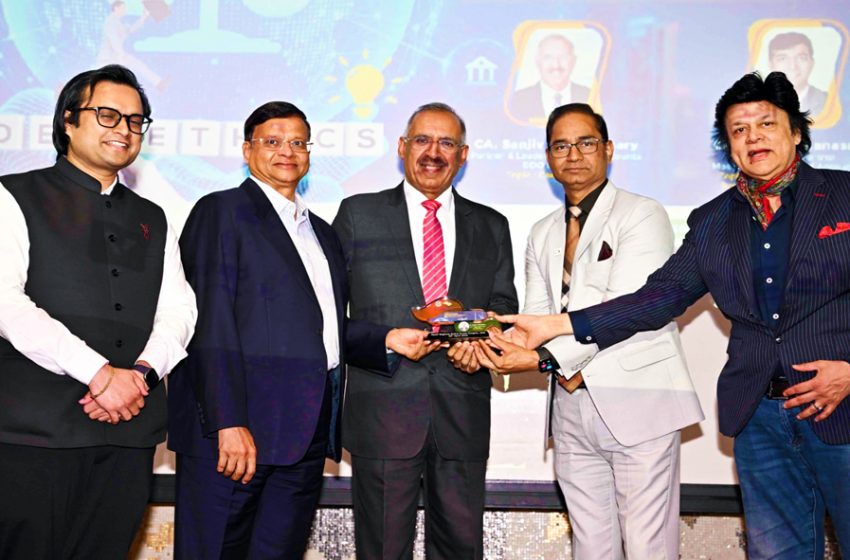Elite Group Holding Drives Excellence in Mobility with SOUEAST Motor’s UAE Debut
ICAI Dubai Chapter Prepares Accounting Professionals for IESBA Code of Ethics before December 31 deadline in the UAE

As the UAE implements the latest Code of Ethics announced by the International Ethics Standards Board for Accountants (IESBA) on December 31, 2023, all the UAE-based accounting and auditing professionals will have to adhere to the new set of Code of Ethics – setting a very high standard in compliance.
Dubai, UAE; May 3, 2023
All accounting and auditing professionals in the UAE will have to maintain the highest level of compliance as per the new Code of Ethics announced by the International Ethics Standards Board of Accountants that is going to be implemented in the UAE by December 31, 2023, senior officials and accounting experts said at a conference organised by the Dubai Chapter of the Institute of Chartered Accountants of India.
CA Jai Prakash Agarwal, Secretary of the ICAI Dubai Chapter, conducted the proceedings of the conference participated by more than 400 active members of the ICAI and he made members re-live moments from iconic Bollywood movie Deewar of 1975, well connecting with the topics of code of ethics and licensing.
International Ethics Standards Board of Accountants (IESBA), a global authority on ethics and best practices, keeps updating the international Code of Ethics for accounting and auditing professionals. Abu Dhabi Accountability Authority has recently announced that it has approved the IESBA Code of Ethics.
“In accordance with the guidelines published by the IESBA, the Abu Dhabi Accountability Authority has recently announced the approval of a Code of Ethics that comes into effect on December 31 this year,” CA Harikishan Rankawat, Chairman of ICAI Dubai Chapter, told delegates at the conference attended by more than 400 accounting and auditing professionals.
“From December 31 onwards, accountants and auditors in the UAEwill have to adopt this Code of Ethics and ensure the highest standard. This will also put us ahead of other countries in terms of ensuring the highest level of compliance.
“Statutory Auditors are required to elevate audit quality and uphold the principles of transparency, integrity, objectivity, accountability, due diligence, confidentiality, and professional conduct. Further, this Code of Ethics emphasises, how fundamental it is for accountants and auditors to preserve non-conflict of interest and objectivity, while preparing Financial Statements in conformity with international standards and procedures.
He said, the Ethical Standards Board of The ICAI has also revised the 12th edition of Code of Ethics, which has come into effect from 1st July, 2020 and there are 3 volumes of this Code of Ethics.
“The Fourth Edition of The Code of Ethics was issued by the ICAI in February 2021 by Ethical Standards Board under the guidance of CA Atul Kumar Gupta, our Former President. The ICAI prescribes the norms of right conduct for the members of the Institute. It also lays down principles and rules, which guide the members in the situation of ethical dilemmas,” he said.
ICAI represents one of the largest groups of accounting and auditing professionals worldwide. It has about 351,232 qualified chartered accountants based in India and abroad and 200,000 Article Assistants. Further, there are around 750,000 students enrolled in the chartered accountancy courses offered by the ICAI at the moment.
Currently the ICAI has its presence in 47 Countries having 45 Chapters and 32 Representative Offices across 77 Global cities. It has its overseas offices in Dubai and Singapore. There are more than 8,000 Indian chartered accountants active in the UAE’s private sector spread across the country. With more than 3,100 members who manage 1,500 large businesses in Dubai, the ICAI Dubai Chapter is one of the largest professional groups in the UAE. It has recently completed 40 years in the UAE and has emerged as the largest overseas chapter of the ICAI.
Explaining the IESBA Code of Ethics, CA. Sanjiv K Chaudhary, Partner and Leader – Strategic Accounts, BDO India LLP and a distinguished IESBA Member, said, “Ethics comes naturally to us. But we still need some codes for formal practice and other legal requirements.
“Code of Ethics also evolves with time as we discover new way of doing business and with the development of new products, processes and systems. So, we need to update the Code of Ethics, such as the development of the Cryptocurrency adds a new dimension to the Code of Ethics.
“Besides, the expectations of the people have changed. Often, we have to ask ourselves, even if it is legally correct, is it ethically correct?”
He says the responsibility of accounting professionals are vast and wide and they have to report anything that might be beyond their official scope of work – even non-financial aspect of business.
“You must report any non-compliance issues that comes to your attention even if these are non-financial issues – because the expectations from you is to report it,” he says.
“The mission of the IESBA Code of Ethics is to set high quality international ethical standard for independent accounting and auditing professionals is to serve public interest.”
IESBA Code of Ethics applies to all public accountants and are based on internationally accepted principles that are adopted in 130 jurisdictions across the world.
The Code of Ethics conference also shed lights on Anti-Money Laundering – a major source of financial crime that the chartered accountants have to deal with often.
In her presentation Sakina Dickenwala, Associate Partner of Legal Services at the MBG Corporate Services, said, “Money laundering is a financial crime in which the source of illegally acquired money or goods is hidden from law enforcement and financial regulators by generating the appearance of legitimacy for the illicit gains. Money laundering happens in almost every country in the world, and a single scheme typically involves transferring money through several countries in order to obscure its origins. For example, tax evasion, bribery, fraud, illegal arms sales, smuggling and other activities.
“The first step in money laundering is its aim to push dirty money into clean financial systems through a series of numerous transactions that are small enough to avoid scrutiny.”
Explaining the risk profile of various customers, she said all public accounting firms should have fool-proof internal processes on transparency, compliance, implementation of the Code of Ethics across all levels and documentation procedures in order to ensure the best practices.
“Each business units should deploy a Compliance Officer to oversee any compliance issue with regards to dealing with clients and unsourced funds,” she said. “There should be a robust compliance policy and a culture of reporting on any suspicious transactions.”
CA Dheeraj Ranasaria, Managing Partner of Mac and Ross Chartered Accountants, who has recently obtained the UAE Auditors Practicing Certificate, explained the detailed procedures of how to obtain the certificate that allows them to certify professional audit reports – that will become crucial once the UAE Corporate Tax Law comes into effect in June this year.
ICAI (Dubai) Chapter, established in 1982, is the largest, most active and award-winning chapter among the 45 overseas chapters of ICAI. It has registered a phenomenal growth in membership in recent years and currently has over 3,100 members representing more than 1,550 multinational and other companies.





